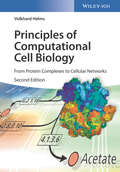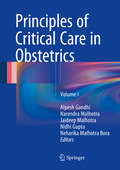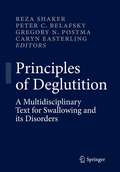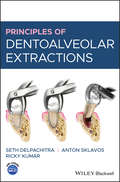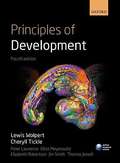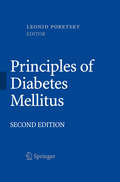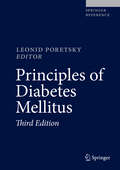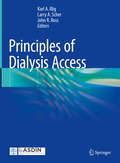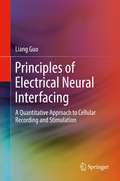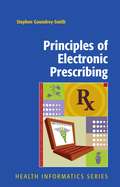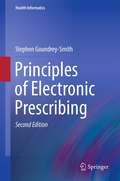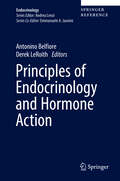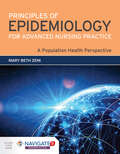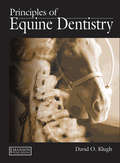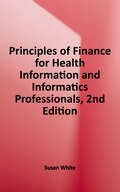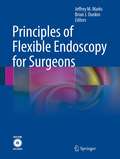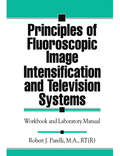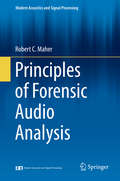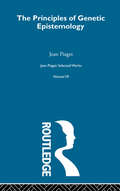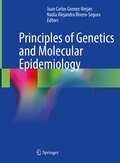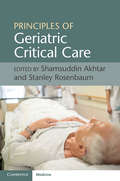- Table View
- List View
Principles of Computational Cell Biology: From Protein Complexes to Cellular Networks
by Volkhard HelmsComputational cell biology courses are increasingly obligatory for biology students around the world but of course also a must for mathematics and informatics students specializing in bioinformatics. This book, now in its second edition is geared towards both audiences. The author, Volkhard Helms, has, in addition to extensive teaching experience, a strong background in biology and informatics and knows exactly what the key points are in making the book accessible for students while still conveying in depth knowledge of the subject.About 50% of new content has been added for the new edition. Much more room is now given to statistical methods, and several new chapters address protein-DNA interactions, epigenetic modifications, and microRNAs.
Principles of Critical Care in Obstetrics
by Alpesh Gandhi Narendra Malhotra Jaideep Malhotra Nidhi Gupta Neharika Malhotra BoraCritical care in obstetrics is an upcoming specialty in the developing countries. This book is first of its kind as there are very few books written on this subject. The book discusses various aspects of critical care in obstetrics starting from the basic principles, physiology, ethics, monitoring and organization of a critical care unit. The various chapters cover management of life threatening illnesses involving various organ systems of the body of a pregnant woman. Furthermore, the management of a pregnant woman is unique as it involves not only management of the patient but the developing fetus in her womb as well. This book aims to help the obstetricians, postgraduate students and critical care providers with the management protocols in dealing with critically ill pregnant women.
Principles of Deglutition
by Gregory N. Postma Reza Shaker Caryn Easterling Peter C. BelafskyPrinciples of Deglutition is the first in class comprehensive multidisciplinary textbook to encompass the entire field of normal and disordered deglutition. It is designed as the definitive text for all those who desire to further their knowledge of the dynamic and expanding field of deglutology. The text is created to serve as a treasured reference for clinicians, educators and trainees from such diverse backgrounds as gastroenterology, speech language pathology, otolaryngology, rehabilitation medicine, radiology and others. Principles of Deglutition brings together the state-of-knowledge from 12 disciplines involved in dysphagia through contributions of over one hundred thought leaders and master clinicians for the benefit of patients and providers alike. It concisely organizes the wealth of knowledge that exists in each of the contributing disciplines into one comprehensive information platform. Principles of Deglutition provides a one-stop destination for members of all specialties to obtain state-of-the-art and critically reviewed information regarding deglutition physiology, pathophysiology, diagnosis and management. It delivers a comprehensive and in depth review of deglutition related cerebral cortical, brainstem, peripheral nerves, and neuromuscular mechanisms, advanced diagnostic modalities and standard of care and cutting edge medical, rehabilitative and surgical treatments. It is an essential reference for all deglutologists.
Principles of Dentoalveolar Extractions
by Seth Delpachitra Anton Sklavos Ricky KumarCombines the basic sciences and principles of dentoalveolar extractions with basic and advanced surgical techniques Principles of Dentoalveolar Extractions is a comprehensive, technical text covering the basic sciences and principles of dentoalveolar extractions, exploring both the basic surgical techniques and advanced surgical practices. Highly illustrated with colour photographs throughout, this text discusses the procedures, pitfalls, and practicalities of exodontia. It highlights the most common surgical principles encountered in clinical practice, the range of surgical instruments available, and how to manage the potential complications associated with extraction procedures. This important text: Focuses solely on dentoalveolar extractions and surgery Contains full colour photographs and detailed illustrations to aid learning Offers a technical walk-through guide that can be used as a reference prior to surgery Includes a Preface written by Professor Andrew A. C. Heggie, AM Written for dental students, surgical trainees and other dental professionals, Principles of Dentoalveolar Extractions provides a comprehensive and pragmatic review of dentoalveolar extractions.
Principles of Development (Fourth Edition)
by Lewis Wolpert Cheryll TickleDevelopmental biology is at the core of all biology of multicellular organisms. It deals with the process by which the genes in the fertilized egg control cell behavior in the embryo and so determine the character of the animal or plant. Evolution operates by changing the development of the organism so that a better-adapted form develops.
Principles of Diabetes Mellitus
by Leonid Poretsky"Principles of Diabetes Mellitus, Second Edition" is an important update to the comprehensive textbook first published in 2002 and reissued in 2004. It is written for physicians of all specialties who, on a daily basis, deal with an illness which has reached epidemic proportions. The book is also intended for medical students and investigators of all aspects of diabetes. The last five years have witnessed major developments in our understanding of diabetes and in therapeutic approaches to this disease. Thus, in addition to updating all chapters, the authors added eight new chapters to the second edition. "Principles of Diabetes Mellitus, Second Edition" covers diabetes in all of its aspects - genetics, epidemiology, pathophysiology, clinical manifestations, therapy and prevention.
Principles of Diabetes Mellitus
by Leonid Poretsky"Principles of Diabetes Mellitus, Second Edition" is an important update to the comprehensive textbook first published in 2002 and reissued in 2004. It is written for physicians of all specialties who, on a daily basis, deal with an illness which has reached epidemic proportions. The book is also intended for medical students and investigators of all aspects of diabetes. The last five years have witnessed major developments in our understanding of diabetes and in therapeutic approaches to this disease. Thus, in addition to updating all chapters, the authors added eight new chapters to the second edition. "Principles of Diabetes Mellitus, Second Edition" covers diabetes in all of its aspects - genetics, epidemiology, pathophysiology, clinical manifestations, therapy and prevention.
Principles of Dialysis Access
by Karl A. Illig Larry A. Scher John R. RossThis multidisciplinary textbook has been written and edited by multiple experts in the field to explore and define the management strategies for all types of dialysis access. With kidney failure a major public health problem worldwide and the care of these patients being widely regarded as suboptimal in the conventional surgical and interventional world, this reference combines the experience and knowledge of a world-renowned team of surgeons, interventionalists and nephrologists to definitively address this topic without regard to specialty. Principles of Dialysis Access provides a thorough review of the management of all types of access for patients requiring dialysis. It is designed for access surgeons, interventional radiologists, interventional nephrologists, nephrologists and all others specializing in dialysis access. As the only comprehensive multi-author interdisciplinary textbook on this topic, it is essential reading for all who specialize in this field.
Principles of Effective Parenting: How Socialization Works
by Joan E. GrusecGrounded in pioneering research, this authoritative text examines the parenting strategies that help children and adolescents develop into productive, happy members of society. Joan Grusec gives students and practitioners a roadmap for navigating the vast, seemingly contradictory literature on parenting. Rather than advocating one "best" style of parent–child interaction, Grusec identifies five domains of socialization and shows that different ways of responding to children are appropriate for each one. Chapters on each domain--protection, reciprocity, control, guided learning, and group participation--combine theory, empirical findings, cross-cultural considerations, and real-world applications. Personal recollections from culturally diverse young adults illustrate how parents helped impart important life lessons. Learning exercises present examples of children's behavior and invite the reader to select the most effective parenting action from several possible options.
Principles of Electrical Neural Interfacing: A Quantitative Approach to Cellular Recording and Stimulation
by Liang GuoThis textbook fills a gap to supply students with the fundamental principles and tools they need to perform the quantitative analyses of the neuroelectrophysiological approaches, including both conventional and emerging ones, prevalently used in neuroscience research and neuroprosthetics. The content grows out of a course on Neuroengineering and Neuroprosthetics, which the author has taught already several times. The key problems the author addresses include (1) the universal operating mechanisms of neuroelectrophysiological approaches, (2) proper configuration of each approach, and (3) proper interpretation of the resulting signals. Efforts are made both to extract the universal principles underlying this common class of approaches and discern the unique properties of each individual approach. To address these important problems, equivalent electrical circuit modeling and signal analysis are used to unravel the functioning mechanisms and principles and provide sound interpretations to the associated signals and phenomena. This book aims to derive analytical solutions to these equivalent circuits, which can offer clear and complete mechanistic insights to the underlying biophysics.
Principles of Electronic Prescribing
by Stephen Goundrey-SmithElectronic prescribing (EP) is a complex discipline, the success of which relies on the successful interplay of system design, data support and clinical practice. It represents the use of electronic systems to facilitate and enhance communication of a prescription or medicine order, and improves legibility and completeness of prescriptions, improves availability of electronic decision support tools at the point of prescribing, enables a comprehensive audit trail, and reduces medication-related errors. These benefits are far-reaching in significance, both in terms of their effects on risk management and risk reduction and their financial impact. Given the likely growth of interest in electronic medicines management, this discussion of relevant design issues and their impact is timely.<P><P> Electronic Prescribing: Principles and Practice discusses the basic principles of the design and implementation of secondary care electronic medicine management systems, and how they impact hospital workflow and clinical practice. It documents the key aspects of EP systems for use in secondary care, including design issues, data support, benefits and the ways in which electronic medicines management systems can optimize clinical and professional practice.Because of the significance of electronic medicines management to the whole medical supply chain, and the various stakeholders involved in the IT implementations, the book will be of interest to a wide range of professionals, from hospital pharmacists and prescribing physicians to health system managers and informaticians.
Principles of Electronic Prescribing, 2nd Edition
by Stephen Goundrey-SmithOver the next few years, the Connecting for Health IT programme for the NHS in England is due to implement electronic prescribing systems at all hospitals in England. Furthermore, the other UK countries are likely to follow suit with clinical IT implementation programmes, and these developments will generate interest in electronic prescribing at European and international level. There is therefore likely to be an exponential growth in the significance of electronic prescribing over the next ten years. Principles of Electronic Prescribing discusses the basic principles of design and implementation of secondary care electronic medicines management systems, and how their design and configuration can impact on benefits realization, hospital workflow and clinical practice.
Principles of Endocrinology and Hormone Action
by Antonino Belfiore Derek LeRoithThis volume provides comprehensive coverage of the current knowledge of the physiology of the endocrine system and hormone synthesis and release, transport, and action at the molecular and cellular levels. It presents essential as well as in-depth information of value to both medical students and specialists in Endocrinology, Gynecology, Pediatrics, and Internal Medicine. Although it is well established that the endocrine system regulates essential functions involved in growth, reproduction, and homeostasis, it is increasingly being recognized that this complex regulatory system comprises not only hormones secreted by the classic endocrine glands but also hormones and regulatory factors produced by many organs, and involves extensive crosstalk with the neural and immune system. At the same time, our knowledge of the molecular basis of hormone action has greatly improved. Understanding this complexity of endocrine physiology is crucial to prevent endocrine disorders, to improve the sensitivity of our diagnostic tools, and to provide the rationale for pharmacological, immunological, or genetic interventions. It is such understanding that this book is designed to foster.
Principles of Epidemiology for Advanced Nursing Practice: A Population Health Perspective
by Mary Beth ZeniPrinciples of Epidemiology for Advanced Practice Nurses provides students and practitioners with an overview of epidemiology concepts as well as the history, models and frameworks in use today.
Principles of Equine Dentistry
by David O KlughThe equine dentition (hypsodont) develops differently from that of humans and small animals (brachydont) yet many of the principles of general dentistry are applicable to the equine species. Some are not.Dr Klugh and his contributing authors identify, apply and evaluate the principles of equine dentistry in relation to the horse-their similarities
Principles of Finance for Health Information and Informatics Professionals
by Susan WhitePrinciples of Finance for Health Information and Informatics Professionals, Second Edition, arms health information management (HIM) students with the foundational knowledge needed to navigate the complexities of healthcare financial management. Using healthcare-based examples, this book guides students through analyzing financial statements, creating budgets, and managing revenue and expenses to bolster understanding of real-world business practices. It deconstructs financial performance metrics and familiarizes readers with identifying variance, financing, and capital investments to provide tools for sound financial decision making. Key Features - Features new content on revenue and expense management and budgets presented in a way that is relevant to the healthcare environment - Covers the essentials for understanding and applying financial management concepts to an HIM professional's everyday roles and responsibilities - Presents finance and accounting vocabulary as defined in a real-world context for the healthcare environment - Includes case study data for hands-on practice
Principles of Fish Immunology: From Cells and Molecules to Host Protection
by Kurt Buchmann Christopher J. SecombesThis textbook provides a highly accessible and concise overview on the innate and adaptive immune systems in fish as well as on fundamentals and latest developments in fish vaccinology. It introduces the anatomy and molecular functions of immune organs and furthermore examines in detail the interactions between the host immune systems and different types of pathogens.The textbook is essential reading for students in Veterinary/Fish Medicine, Aquaculture and Immunology. Furthermore, the volume serves as a quick reference for Fish Pathologists and Aquaculturists.Chapter 2 is available open access under a Creative Commons Attribution 4.0 International License via link.springer.com.
Principles of Flexible Endoscopy for Surgeons
by Brian J. Dunkin Jeffrey M. MarksWritten entirely by surgical endoscopists, Principles of Flexible Endoscopy for Surgeons presents a comprehensive overview of past, present, and future flexible gastrointestinal endoscopic techniques, with a focus on educating surgeons who may or may not already have the skills to perform flexible endoscopy. In addition to the endoscopic management of surgical issues, the volume describes the role of surgery in the management of endoscopic complications. Basic as well as advanced flexible endoscopic techniques are presented in both a didactic and visual mode, with representative endoscopic images and video clips. Recent endoscopic advancements which are not routinely a core component of surgical training programs are also covered in detail. Extensively illustrated with endoscopic images and accompanied by a DVD, Principles of Flexible Endoscopy for Surgeons is a valuable resource for surgeons on all facets of flexible endoscopy.
Principles of Fluoroscopic Image Intensification and Television Systems: Workbook and Laboratory Manual
by Robert J. ParelliThis unique workbook can be used as a stand-alone text or supplemental text for any course designed to enhance the work of radiologic technology students. It will also serve the needs of graduate radiographers as well as the physician in learning specific areas of the Fluoroscopic Image Intensifier such as:
Principles of Food Toxicology
by Tõnu PüssaFollowing in the tradition of the popular first edition, Principles of Food Toxicology, Second Edition integrates the general principles of toxicology with a systematic characterization of the most important food-borne toxicants. Ideal as a textbook in a food toxicology course, and also as a monograph dealing with principles of food toxicology as t
Principles of Forensic Audio Analysis (Modern Acoustics and Signal Processing)
by Robert C. MaherThis book provides an expert introduction to audio forensics, an essential specialty in modern forensic science, equipping readers with the fundamental background necessary to understand and participate in this exciting and important field of study. Modern audio forensic analysis combines skills in digital signal processing, the physics of sound propagation, acoustical phonetics, audio engineering, and many other fields. Scientists and engineers who work in the field of audio forensics are called upon to address issues of authenticity, quality enhancement, and signal interpretation for audio evidence that is important to a criminal law enforcement investigation, an accident investigation board, or an official civil inquiry.Expertise in audio forensics has never been more important. In addition to routine recordings from emergency call centers and police radio dispatchers, inexpensive portable audio/video recording systems are now in widespread use. Forensic evidence from the scene of a civil or criminal incident increasingly involves dashboard recorders in police cars, vest-pocket personal recorders worn by law enforcement officers, smart phone recordings from bystanders, and security surveillance systems in public areas and businesses. Utilizing new research findings and both historical and contemporary casework examples, this book blends audio forensic theory and practice in an informative and readable manner suitable for any scientifically-literate reader. Extensive examples, supplementary material, and authoritative references are also included for those who are interested in delving deeper into the field.
Principles of Forensic Toxicology
by Barry S. Levine Sarah KerriganThe fifth edition of the best-selling Principles in Forensic Toxicology continues in the tradition of excellence in academic publishing. With over 10 years of classroom-tested and continually updated content, the new edition contains significant updates and 7 new chapters on new topics including drug-facilitated crimes, derivatization, quantitation, measurement uncertainty/traceability, statistics, oral fluid testing, and drugs in embalmed specimens. Part One covers the major sub-disciplines of forensic toxicology in addition to pharmacological concepts. Part Two addresses specimen preparation, laboratory testing and instrumental analysis, while Part Three discusses common analytes including cocaine, opioids, alcohol, and marijuana. Adopted for courses in many of the top universities for forensic science and used by respected medical examiner’s offices and crime laboratories worldwide, Principles of Forensic Toxicology prepares the next generation of forensic toxicologists and continues to be an important reference in professional practice.
Principles of Genetic Epistemology: Selected Works vol 7
by Jean PiagetFirst published in 1997. Routledge is an imprint of Taylor & Francis, an informa company.
Principles of Genetics and Molecular Epidemiology
by Juan Carlos Gomez-Verjan Nadia Alejandra Rivero-SeguraThis book covers some of the most novel genetic and genomic concepts in epidemiology, such as geospatial statistics and systems biology from a clinical point of view by explaining molecular applications with accessible human studies. Featuring a comprehensive table of contents, it includes chapters from genomics and epidemiology surveillance to transcriptomics and alternative splicing principles.Across 17 well-organized chapters, this book meets attempt to explain easily to clinicians and students with basic principles of the genetics, genomics, molecular biology and its applications to epidemiology and public health. The text is distinct from other literature on the market because it covers useful genomic tools applied in epidemiology for clinicians who may not be experts in this branch of health science. Principles of Genetics and Molecular Epidemiology demystifies the idea that biomedicine is far from being applied in both epidemiology and clinical practice.
Principles of Geriatric Critical Care
by Shamsuddin Akhtar Stanley RosenbaumThe proportion of the population of octogenarians and elderly patients presenting for intensive care is rapidly increasing thus exacerbating the need to modify our critical care management to cater for this patient group. This book will provide practical guidance on all issues related to the critical care of elderly patients, incorporating physiological and epidemiological information, clinical guidance, ethical and end-of-life issues and advice about optimal use of drugs and new technologies. Complications of polypharmacy, high-risk surgery and increased recovery times are also discussed. Chapters are concise, each including a list of key points and summary of available data, making this a quick reference for experienced consultants, as well as a useful resource for trainees preparing for exams.
